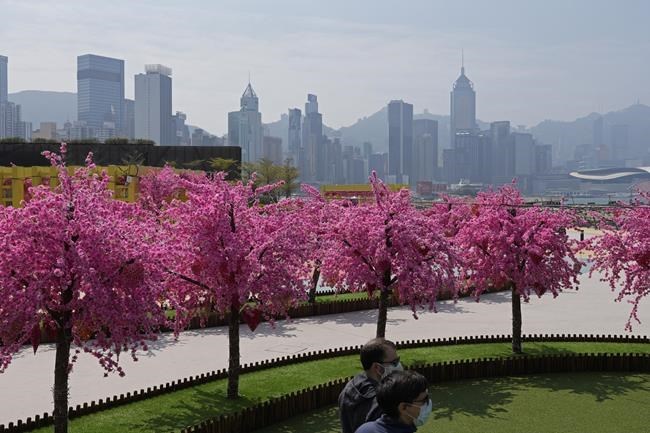Hong Kong's government is betting that Canadian companies and other overseas businesses will put profits over politics as it tries to lure talent and industry back to the city that has been cracking down on dissent after quashing a pro-democracy protest movement.
A Toronto-based official involved in the pitch that was advertised in Canadian newspapers this week says it's targeting companies that want to "just get on with business" and remain "focused on their balance sheets."
Billions of dollars in Hong Kong government funding are available to foreign firms setting up shop there.
But activists warn that businesses and individuals alike considering a move to Hong Kong face risks since the passage of a controversial national security law in 2020 and subsequent arrests of government critics.
Aileen Calverley, co-founder of the human rights group Hong Kong Watch, said Canadian authorities should be highlighting such risks to Canadian companies.
"For tourists we get some warning if it's not safe to travel there, so what about for our businesses?" Calverley said. "It was a free city, not anymore."
Hong Kong's newly established Office for Attracting Strategic Enterprises is being administered through the government's global network of quasi-diplomatic trade offices in cities including Toronto, Dubai, Beijing, London, New York, Tokyo and Sydney.
On June 5, the Toronto office placed advertisements saying Hong Kong wants to attract "strategic" businesses, "namely life and health technology, artificial intelligence and data science, financial technology and advanced manufacturing and new-energy technology."
"Hong Kong is a leading international financial and trade centre, and regional innovation and technology hub, located right at the heart of Asia," the ad states. "Under 'one country, two systems', Hong Kong remains a more free and open economy which provides businesses easy access to the Mainland China and other key Asian markets."
The push comes after three years of population decline in Hong Kong, and an outflow of thousands of young Hong Kongers to Canada, Britain and other countries that have set up dedicated immigration pathways for them in light of the political crackdown that followed vast street protests in 2019.
Christopher Chen, head of business and talent attraction at the Hong Kong Economic and Trade Office in Toronto, said the office would help businesses navigate licensing regimes and the city's real estate market, while offering tax concessions and other services.
He said its function was purely economic, and not political, and questions about the national security law and crackdowns on dissent were out of his purview.
"The national security law is an anti-sedition law and very few people intentionally move to another country with the intention of engaging in seditious behaviour," he said.
"Canadian companies that we work with, which are like the largest banks, insurance companies, technology companies, they don't necessarily engage in open political discourse with, say, the mainland Chinese government or the Hong Kong government and just get on with business. I think there is a separation."
The advertisements tout $5 billion in government "co-investment" funds for companies moving to Hong Kong, although Chen said this was not specifically devoted to the strategic enterprises campaign, instead likening it to a sovereign wealth fund.
But activists warn of risks to both businesses and individuals due to the uncertainty and upheaval since the passage of the security law.
Hong Kong Watch, which launched its Canadian arm in late May, says Hong Kong's Economic and Trade Offices shouldn't receive the diplomatic privileges they enjoy under a 1996 Canadian law, since the People's Republic of China already maintains embassies and consulates in Canada.
Calverley said Hong Kong's push to attract Canadian companies is due to an "exodus" of people from the city, and initiatives like the strategic enterprises plan are an attempt to stem the tide of those fleeing potential persecution.
She said companies setting up in Hong Kong risk not only their money, but the safety of employees. She cited the detention of Canadians Michael Kovrig and Michael Spavor, who spent more than 1,000 days in Chinese custody in what was widely thought to be a retaliatory move for the 2018 arrest in Canada of Huawei executive Meng Wanzhou.
Calverley has urged Canadian policymakers to take a harder line on China since the political situation in Hong Kong "spiralled downhill."
Global Affairs Canada said in an emailed response that it couldn't speak to the specifics of the Hong Kong initiative, but International Trade Minister Mary Ng "has always been clear that we will support businesses wherever they choose to operate internationally."
Global Affairs' travel advice for Hong Kong warns of "arbitrary enforcement of local laws," and tells travellers that internet traffic is monitored for "material appearing to be seditious or that is critical of mainland China and local authorities."
"You shouldn’t expect internet privacy," the advisory says, adding that journalists also may face censorship especially if critically reporting on the Chinese government.
The Canadian government's travel advice runs counter to Hong Kong's pitch to companies.
Chen said Hong Kong "is ruled by law, not ruled by authority."
"The assumption is that any Canadian entity that wants to expand its operations into Hong Kong or take a first foray is going to engage in activities that are conducive to its own commercial growth," he said. "There is a separation between politics and economics when it comes to the consideration of expansion of business."
This report by The Canadian Press was first published June 10, 2023.
Darryl Greer, The Canadian Press



